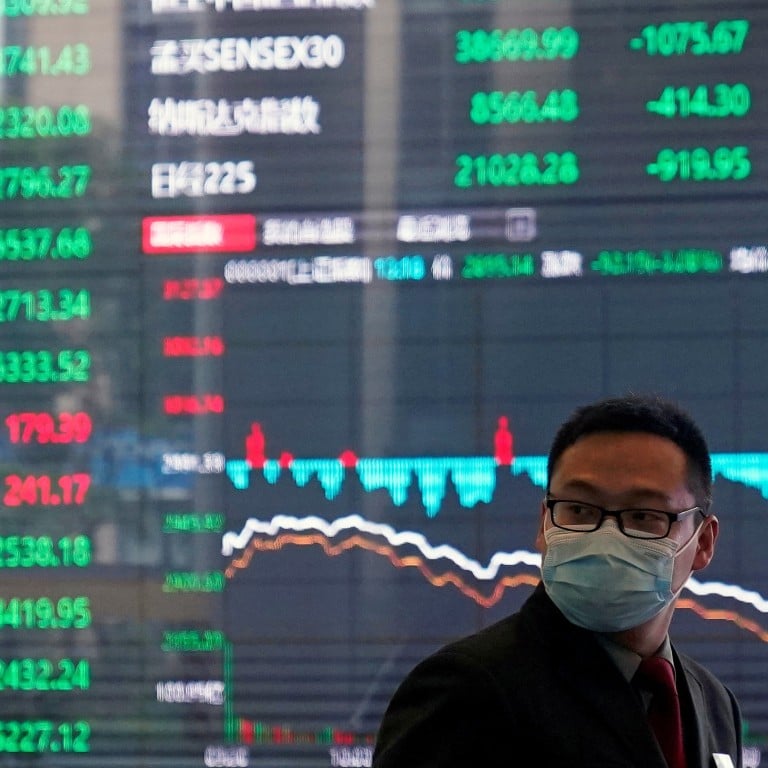
Hong Kong stocks plunge more than 1,100 points as collapsing oil market adds to the woes of a widening coronavirus outbreak
- Hang Seng Index plunges by as much as 4.3 per cent, in its biggest one-day decline in more than two years
- Stock indexes tumble in Asia, from Seoul to Wellington; Alibaba sees worst fall since Hong Kong secondary listing on November 26
The Hang Seng Index fell 4.2 per cent at its close to 25,040.46, bringing its decline to 11.2 per cent for the year. Hong Kong’s stock rout spilled over to every other major Asian market, with benchmarks slumping from Seoul to Wellington.
The Shanghai and Shenzhen stock markets also fell, with their benchmark indexes each slumping by more than 3 per cent to the lowest in months. The CSI 300 index, which tracks stock prices in both markets, plunged by 3.2 per cent to 3,997.13.
“I expect the market to be extremely volatile in the near future, [proving] that our wait-and-see suggestion is correct,” said Kenny Wen, wealth management strategist at Everbright Sun Hung Kai.
“Technically, the Hang Seng Index may have further downside. I suggest that investors should trim their exposures until we have a rebound later.”
The oil-price crash would upend politics and disrupt the world’s economies, exacerbate strains in US high-yield credit and complicate the work of central bankers as they try to model the impact of the virus on economies, analysts said.
“The market is shocked with the Saudi vow to step up oil production,” said Alan Li, portfolio manager at Atta Capital. “The collapse of oil prices triggered further sell-off of other asset classes. People are waiting for the response of other Opec members and Russia.”
The surprise drop in oil prices pushed down the stock prices of China’s three largest state-owned companies amid concern that their margins would be eroded.
Cnooc Limited, the country’s dominant offshore oil and gas producer, plunged by as much as 21.8 per cent in Hong Kong before recovering some of the losses to close at HK$8.79. PetroChina, the nation’s top oil and gas producer, sank 9.6 per cent to HK$2.72, while China Petroleum & Chemical (Sinopec) lost 2.8 per cent to HK$3.82.
Declines in the three oil companies, also index heavy weights on the benchmarks of Hong Kong and Shanghai, also weighed down on the broader market.
The rout spilled over to other industries, affecting every other sector from banking to technology. Shares of Alibaba Group Holding, the world’s largest e-commerce company and owner of South China Morning Post, fell 5 per cent to HK$193.50, their biggest one-day percentage fall since their secondary listing in Hong Kong on November 26.
Tencent Holdings, China’s social media and games publisher, fell 4.6 per cent to HK$377.40. Casino stocks dropped amid concern that a worsening global coronavirus outbreak would deter gamblers and high rollers from Macau’s games tables. Galaxy Entertainment, one of the six casino concessionaires in the city, plunged 4.4 per cent to HK$48.75.
Tokyo’s stock market plummeted, with the Nikkei 225 index falling 5.1 per cent, its biggest single-day decline since November 9, 2016. The gauge had tumbled by as much as 6 per cent earlier in the day. Stocks fell across the board, from the maker of excavators and construction equipment Komatsu to the carmaker Toyota Motor.
Australia’s S&P/ASX200 closed down 7.3 per cent, the biggest fall since October 10, 2008. Seoul’s Kospi closed down 4.19 per cent and the tech-heavy Kosdaq tumbled 4.38 per cent.



